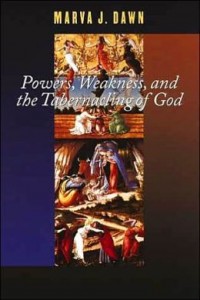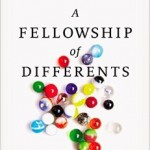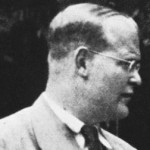 Continuing the series on “Slow Church and the Urgency of Justice” today. This is the sixth post. (Link goes to the initial post in the series).
Continuing the series on “Slow Church and the Urgency of Justice” today. This is the sixth post. (Link goes to the initial post in the series).
Previous post: “God Tabernacling in Our Weakness”
Continuing the theme of our last post in this series (linked above), Marva Dawn in her important book Powers, Weakness and the Tabernacling of God, begins her exploration of the Ephesians 6 text by noting that because God tabernacles in our weakness, we can be strong in the Lord’s power. The we here is important, Dawn emphasizes, for it is the the whole Body of Christ — and not the individual Christian that puts on the armor of Christ. She says:
The battle is not only totally dependent on God, but it is also local as well as cosmic, a resistance of evil powers in daily life, particularly in the corporate life of our churches. Putting on the armor is not the work of individual Christians so much as that of the whole Body of the Church. The verb form endunamoo (in Eph 6:10) is a second person plural imperative, so it literally commands, “be empowered, all y’all” as my southern friends would say.
Dawn admits the struggles she has had with how we should understand the military imagery of the text, especially embedded in a militaristic Western culture as we are. Through the work of Tom Yoder Neufeld, Dawn came to see that God is the warrior — and not us — who does battle against the powers, and our focus should be on engagement via the practices named in in Ephesians 6:13-20 (truth, justice peace, liberation, exercise of the word and prayer), and as much on the armor imagery.
At the heart of her reading of this Ephesians 6 passage lie two key paradoxes, ones that I might add are essential to the Slow Church conversation as well:
The first [paradox] is that to counteract the principalities and powers requires a battle, but one that is essentially and entirely nonviolent because it is against the powers and never against the people who might be aligned with them. The second is that the battle requires our active engagement, but it is always God’s work through our weakness.
These paradoxes remind us that Jesus not only taught about the Kingdom of God, but also embodied the way toward the Kingdom of God for us. Although in our culture of instant gratification, we struggle to do the same, in Jesus we find a continuity between ends and means. Dawn cites the collective work of ethicists and peace activists that led to the book Just Peacemaking:
The Followers of the Lamb are those who do the deeds Jesus teaches, who do God’s will, keep God’s word, keep God’s commandments, hold faithful to the testimony of Jesus, do the teachings of Jesus, follow God’s teachings as given through Jesus, obey God’s commands.
Next time, we will dig further into this idea of seeking justice by following in the way of Jesus, a way in which, to use Dawn’s words “effectiveness does not matter.”












